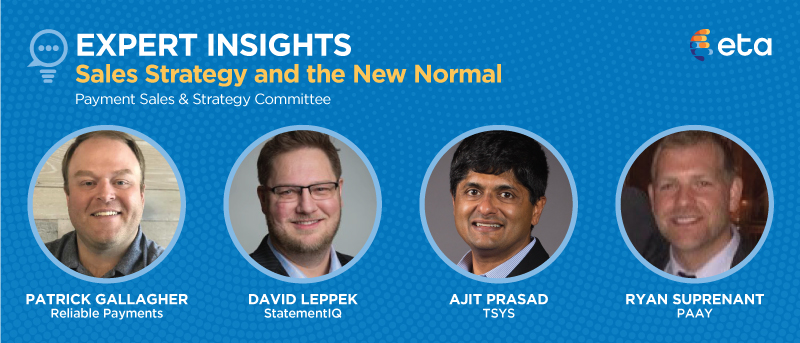ETA Expert Insights: Sales Strategy and the New Normal

1. Has COVID negatively or positively affected your business?
 Patrick Gallagher, Reliable Payments
Patrick Gallagher, Reliable Payments
Obviously, our retail/restaurant side of the portfolio took a big hit, but is slowly coming back. However, the more interesting side of this is that our B2B, “non traditional” merchant side of things have seen a nice increase. Overall, during April and May, we were down 15%, but as of now, we are about back to pre-covid numbers. Additionally, our retail/restaurant clients are reaching out to us now to update technology, which will only strengthen our relationship with them.
 David Leppek, StatementIQ
David Leppek, StatementIQ
As horrible as a global pandemic truly is for the world, I have had no shortage of business, and in fact have increased sales during the past five months. As a payments consultant, I am engaged to help my customers consider transformational projects, and covid has turned the market in an instant, resulting in a lot of work.
 Ajit Prasad, TSYS
Ajit Prasad, TSYS
Both — overall there is a decrease in transactions and volumes earlier in the year but now seems to be recovering. Certain verticals such as liquor, grocery, and ecommerce saw rapid growth during the spring and continue to ramp. A secondary effect, some ISOs are using the downtime to focus on longer term projects such as new technology or new partnerships.
 Ryan Suprenant, PAAY
Ryan Suprenant, PAAY
Our solution lives strictly in a CNP environment so for us it’s been positive. COVID has accelerated the growth of eCommerce and where consumers go, fraudsters follow. With the rise of fraud and chargebacks, especially friendly fraud disputes, we’re receiving more interest and seeing greater acceptance around the need to adopt 3-D Secure.
2. How has coronavirus changed the way you conduct sales? Sales cycle taking longer?
 Patrick Gallagher, Reliable Payments
Patrick Gallagher, Reliable Payments
Our sales process has certainly changed. Our reps in the field have had to transition to a more phone/email sales process. As well, the cycle in most aspects is taking a least one to two weeks longer than normal. This is more because our folks are having to setup Zoom meetings as opposed to hopping in their car to go out and visit the merchant.
 David Leppek, StatementIQ
David Leppek, StatementIQ
Pre-coronavirus, I worked on the road. I had already amassed sixty thousand frequent flyer miles by March 14th, when I locked myself in my basement, yet to have really ventured out again. So now I work and sell from the phone. I am an expert at WebEx and Zoom and Goto Meeting. I have strategically staged the background behind my camera to assure I present well.
The sales process, for me, is similar to pre-coronavirus. I am passed a referral lead, have an introductory call, explain my services, listen to their concerns, and off my solutions. Some sales close quickly, some aren’t ready, and some I don’t want. But the basic sales process hasn’t changed much IMO.
 Ajit Prasad, TSYS
Ajit Prasad, TSYS
Yes — the sales cycles are definitely taking longer than in the past. Previously we would attend trade shows and do face to face visits — now things are done via video and phone. The advantage though is that initial call is done faster as no one is traveling to a meeting. However, it takes a longer time for each party to become comfortable over the phone which ultimately lengthens the deal time.
 Ryan Suprenant, PAAY
Ryan Suprenant, PAAY
PAAY is active at trade shows and events which has been helpful for us in developing new business contacts. Although we appreciate the efforts that are made to host some of these virtually we’ve found it hasn’t had quite the same impact for us from a business development and qualified leads standpoint. We’re still speaking to the same amount of people if not moreso, but the sales cycle has certainly been extended — largely due to what Ajit mentioned in that you’re losing the comfortability and trust factor gained through meeting in person.
3. Changed the products that you sell?
 Patrick Gallagher, Reliable Payments
Patrick Gallagher, Reliable Payments
For our retail/restaurant business, absolutely. This will have as much an impact as did the EMV switch, possibly more. Most of our retail/restaurant establishments are looking to go completely contactless, meaning they want new technology.
 David Leppek, StatementIQ
David Leppek, StatementIQ
The work has changed, if only that it was previously high-touch, face-to-face, and now (beyond remote) I have engaged clients I might never meet.
Concerns have shifted to topics like checking out without touching anything, or card-not-present solutions to card-present industries. New technologies that better serve difficult markets have come to the fore-front and are now suddenly a priority.
 Ajit Prasad, TSYS
Ajit Prasad, TSYS
We are seeing that there is much more interest for following:
1. Curbside pickup as many restaurants have moved to a model where the consumer orders on line & picks up at the curb.
2. As consumers started to venture out the larger demand for contactless as people want to minimize touching a terminal due to health concerns.
3. Growing interest in surcharge type programs as merchants are in a much more precarious position & is a way to pass on costs to the consumers. Of course, there is the risk of alienating customer as well.
 Ryan Suprenant, PAAY
Ryan Suprenant, PAAY
EMV 3-D Secure ride til I die (laughs)
4. In the field — what response are you seeing face 2 face meetings? Are you able to pull doors? Being in the field vs. note? Negative connotation of being in the field?
 Patrick Gallagher, Reliable Payments
Patrick Gallagher, Reliable Payments
According to my reps in the field, it mostly depends on where you are. In the more rural areas, folks are more open to, if not expecting you to meet in person, face to face. In the main cities, though, folks are still leery of meeting in person, and are looking more to meet via Zoom/Teams.
 David Leppek, StatementIQ
David Leppek, StatementIQ
I don’t even try for face-to-face any longer. There are plenty of opinions on the danger of coronavirus. While I personally take it very seriously, even if I did not, I wouldn’t risk upsetting a prospect by ignoring their concerns. When I was young, I read “Dress for Success” by John Molloy. One of his pearls of wisdom was to never wear cologne because you only risk offending a potential prospects opinion. For the same reason, in sales, you should never talk politics, and avoid controversy.
 Ajit Prasad, TSYS
Ajit Prasad, TSYS
Both have gone down. We are starting to see if things pick u July was better, but the first and second quarters really did see a large drop.
 Ryan Suprenant, PAAY
Ryan Suprenant, PAAY
I also haven’t requested nor met with anyone since March. We certainly look forward to getting back to traveling, attending tradeshows, and meeting with clients again hopefully in the near future.
5. What’s the impact on your processing volume and your income?
 Patrick Gallagher, Reliable Payments
Patrick Gallagher, Reliable Payments
April-May, we were down about 15% overall, but last month we were back to pre covid numbers, and this month we are showing growth. It seems as though, for now, we basically have to set our projections back about 3-4 months from what we were expecting at the beginning of the year.
 David Leppek, StatementIQ
David Leppek, StatementIQ
I don’t have processing volume directly, but I can tell you loosely about two of my consulting customers. One saw an 80% drop in volume, and had to radically re-create their business. The other saw an increase in volume of about 20% and saw their most profitable business nearly double. Covid changes the way people shop. It changes how and what they purchase.
 Ajit Prasad, TSYS
Ajit Prasad, TSYS
Both have gone down. We are starting to see if things pick up… July was better, but the first and second quarters really did see a drop except for merchants in liquor and ecommerce.
 Ryan Suprenant, PAAY
Ryan Suprenant, PAAY
The daily number of transactions we touch has grown substantially over the last 6 months. We’ve received more inbound interest and the activity from our current partners has seen an uptick as well.
6. How has covid changed your risk policy? Your validation processes?
 Patrick Gallagher, Reliable Payments
Patrick Gallagher, Reliable Payments
Not much has changed for us, as we do not focus on the “higher risk” industries. However, our reps are paying close attention to the viability of the businesses they are signing up, and going above and beyond to verify the signers on the accounts, since we are not meeting face to face as much.
 David Leppek, StatementIQ
David Leppek, StatementIQ
I have seen low risk ISOs start accepting higher-risk verticals, and other companies expand into products they know to be “not-exactly” compliant, all in an effort to maintain margin. What really scares me, is the number of ISOs and Merchant call-centers who send customer service employees to work from home for the first time ever, when their PCI status was largely predicated on physical security controls. By racing to solve an emergency situation, we might have inadvertently created security problems that won’t be discovered for years.
 Ajit Prasad, TSYS
Ajit Prasad, TSYS
This is a good one — near and dear to everyone’s heart. Generally speaking, risk policy hasn’t changed, but risk tolerance has changed. Merchants that have future deliverables are put through more scrutiny, resulting in declines or needs for reserves or being approved for lower volumes.
 Ryan Suprenant, PAAY
Ryan Suprenant, PAAY
N/A
7. What other products are you selling or considering selling?
 Patrick Gallagher, Reliable Payments
Patrick Gallagher, Reliable Payments
For now, we are just focusing on adding the contactless technologies to support our current and new clients. Nothing other than that right now though.
 David Leppek, StatementIQ
David Leppek, StatementIQ
eCommerce solutions for historically card-present industries are dramatically on-the-rise. Fraud prevention measures are having to re-evaluate the potential for losses.
 Ajit Prasad, TSYS
Ajit Prasad, TSYS
Focusing on eCommerce, contactless as well as PoS systems.
 Ryan Suprenant, PAAY
Ryan Suprenant, PAAY
Before pivoting to 3-D Secure PAAY was a mobile wallet. We’ve had internal discussions around bringing something similar back to market. We’re also forming partnerships with fraud prevention companies to offer additional risk mitigation tools that coexist with 3DS.
8. What is your biggest takeaway from the last 7 months in our new normal?
 Patrick Gallagher, Reliable Payments
Patrick Gallagher, Reliable Payments
We must be resilient, and prepared for anything. However, we can still conduct sales in any type of environment. But now, more than ever, our merchants deserve honest and fair payment processing. They need a company that will consult with them to understand their needs, and get them the best solution for them…not just a processor that wants to sign them up and then raise rates every six months.
 David Leppek, StatementIQ
David Leppek, StatementIQ
What was once considered high risk is now thought of as stable, and what was once low risk is now gone, or radically reduced. Hotel and restaurant is dramatically reduced in processing volume, but restaurant taking card-not-present (take-out or curb-side) is slowly becoming a larger portion of daily processing volume. ECommerce is booming. Select industries (Internet Hosting for example) used to be riskier, but today is a valuable part of every businesses survival strategy.
 Ajit Prasad, TSYS
Ajit Prasad, TSYS
Be flexible — keep an open mind about opportunities to grow in unexpected verticals or merchant pricing models. Also, the acceleration to eCommerce has taken off. With change comes opportunity.
 Ryan Suprenant, PAAY
Ryan Suprenant, PAAY
The rise and adaptation of digital commerce. Whether it’s someone purchasing groceries for the first time, to new online adopters altogether. The impact COVID has had on consumer shopping habits and the carryover that’ll remain in place once this is over.

